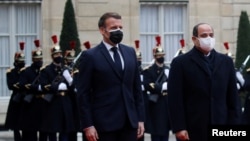As Egyptian President Abdel-Fattah el-Sissi wrapped up a three-day visit to France on December 9, government-tied media back home portrayed the trip as having been flawless and triumphant. However, one issue was missing from their stories about the red carpet, fanfare and military parade with which France greeted el-Sissi – human rights.
At a December 7 news conference in Paris, journalists asked el-Sissi and his host, French President Emmanuel Macron, tough questions about human rights violations under the Egyptian president’s rule, and protesters staged a demonstration outside France's National Assembly.
Standing next to Macron, el-Sissi defended his record.
“It is not appropriate for you to present the Egyptian state, and everything it does for its people and the stability of the region as an oppressive regime,” el-Sissi said, as translated by Al Jazeera.
His claim is misleading: there is abundant evidence that political repression and human rights abuses have been rife during el-Sissi’s rule.
On December 2, ahead of the Egyptian president’s visit, 17 French and international human rights organizations released a letter to Macron urging him to halt providing “unconditional support” for the Egyptian president.
“French diplomacy has, at the highest levels, long indulged President el-Sissi’s brutal repression of any form of dissent. It is now or never for President Macron to stand up for his self-declared commitment to promote human rights in Egypt,” the letter said.
Macron said he brought up human rights during his talks with el-Sissi but would not let it be an obstacle to the two nations’ strategic alliance in the Middle East. “I will not condition matters of defense and economic cooperation on these disagreements (over human rights),” Macron said.
On December 4, two days before el-Sissi left Cairo for Paris, his government released from prison three senior members of the Egyptian Initiative for Personal Rights (EIPR), an independent group that monitors and documents human rights violations in Egypt.
Egyptian security forces had arrested Karim Ennarah, Gasser Abdel-Razek and Mohamed Basheer in mid-November, shortly after they met with foreign diplomats. The three were held on charges of terrorism and spreading false news.
They were freed following an international outcry, with the U.S., U.N. and European Union joining international rights groups to condemn the Egyptian government for what they said were unjust detentions.
Many in Egypt believe American actress and human rights advocate Scarlett Johansson’s involvement in the case made a difference.
On December 1, Johansson released a video demanding the EIPR members’ immediate release. "Speaking out in Egypt today is dangerous," she said. "These men have spent their lives fighting against injustice, and now they find themselves behind bars. They all face bogus charges that could lead to many more years in prison. In fact, their only crime has been to stand up for the dignity of Egyptians."
While the arrest of the EIPR staffers captured the world’s attention, el-Sissi’s critics say it was only the latest in a pattern of abuses.
“Tens of thousands of political prisoners — everyone from Muslim Brotherhood members to journalists and pro-democracy activists — languish in Egyptian jails, which have swelled with detainees since Sissi seized power in a coup in 2013,” wrote World Politics Review managing editor Frederick Deknatel. “Cracking down on human rights and civil society has become all too familiar in Egypt under President Abdel Fattah el-Sissi.”
Human Rights Watch wrote in its World 2020 report: “Under the guise of fighting terrorism, Egyptian authorities showed utter disregard for the rule of law. Since April 2017, President Abdel Fattah el-Sissi has maintained a nation-wide state of emergency that gives security forces unchecked powers. Security forces used torture and enforced disappearances systematically against dissidents from all backgrounds. Egypt’s use of mass trials and the death penalty has mounted, including death sentences against children and death sentences issued in military trials.”
U.N. High Commissioner for Human Rights Michelle Bachelet said in September 2018 that the Egyptian authorities’ mass sentencing, along with the increasing number of detainees sentenced to death or life in prison, constituted a “gross and irreversible miscarriage of justice.”
Bachelet noted that in just one case, 739 people were tried en masse and were not permitted individual legal representation. “In addition, the accused were not given the right to present evidence in their defense, and the prosecution did not provide sufficient evidence to prove individual guilt,” she said.
Bachelet added that there was a “stark contrast” between the immunity granted to state security forces and the way the courts handled the mass trials.
Several months earlier, in July 2018, Egypt had adopted a law granting members of the country’s security forces immunity for any crimes committed between July 3, 2013 – the day Egypt’s military overthrew the government of President Mohammed Morsi – and January 10, 2016.
According to the U.N., Egyptian security forces may have killed "up to 900 mostly unarmed protesters” in Cairo on July 14, 2013.
Following Bachelet’s criticism, in November 2019, an Egyptian court confirmed the death sentences handed down to 75 people and life prison terms imposed on 47 others.
According to the most recent U.S. State Department human rights report, “the Egyptian government or its agents” have been involved in systematic arbitrary arrests, the extra-judicial killing of civilians, torture and forced disappearances. Since 2013, a local NGO received information about 5,600 forced disappearances and documented 1,856, the report said.
In April 2019, Reuters documented 460 such killings in Egypt between July 2015 and December 2018.
In March of this year, the Stockholm International Peace Research Institute (SIPRI) reported that Egypt is one of the top three recipients of French arms, alongside Qatar and India.
According to SIPRI, French arms exports to Egypt have been increasing since the 1980s and “will continue to be at a relatively high level for at least the next five years.”
In its annual report to parliament this year, France’s military said the country’s arms exports in 2019 totaled 8.33 billion euros (approximately $10.13 billion), and that Egypt had received one billion euros ($1.2 billion) in French military aid and equipment.



